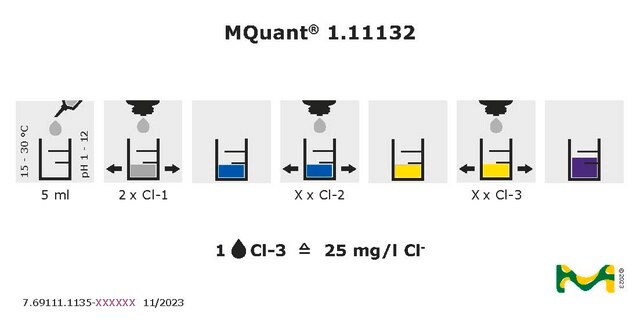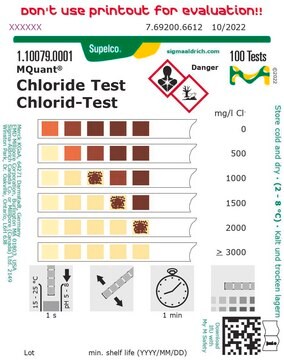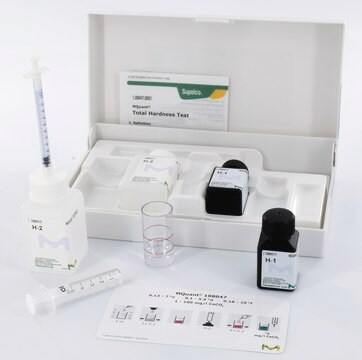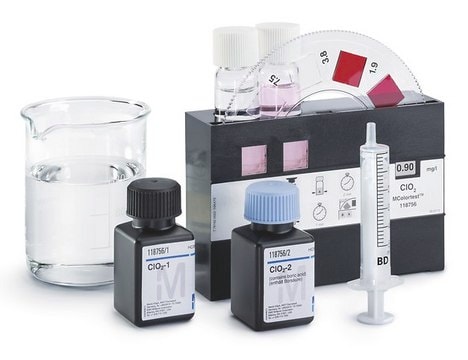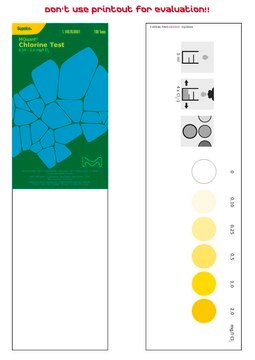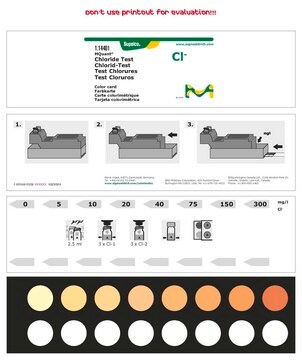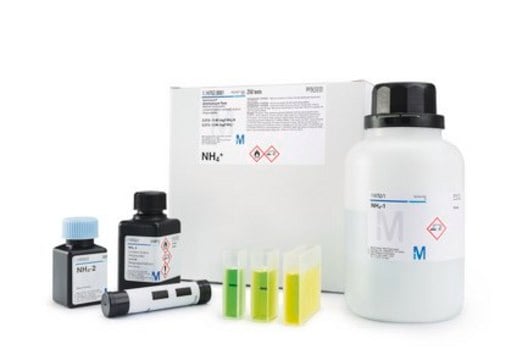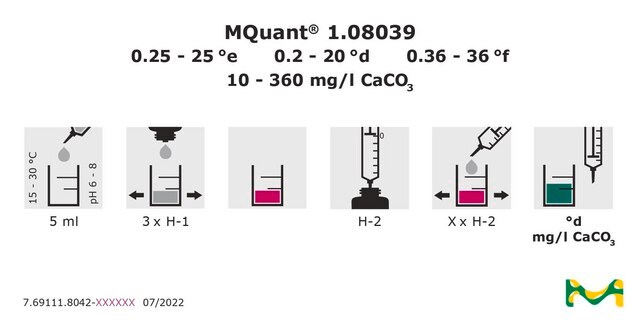1.11106
Chloride Test
titrimetric, for use with MCOLORTEST®
About This Item
Produits recommandés
Analyte(s) spécifique(s)
chloride
Niveau de qualité
Compatibilité
for use with MCOLORTEST®
Méthode de détection
titrimetric
Température de stockage
15-25°C
Catégories apparentées
Description générale
Method
In nitric solution chloride ions are titrated with mercury(II) nitrate solution against 1,5-diphenylcarbazone as the indicator, forming slightly dissociated mercury(II) chloride in the process. At the titration end-point, excess mercury(II) ions react with the indicator to form a blue-violet complex. The chloride concentration is determined from the consumption of titration solution (mercurimetric determination).
The test can be used in
- Groundwater, surface water, and seawater (after dilution)
- Waters from aquaculture
- Drinking water and mineral water
- Water for concrete in the construction industry
- Industrial water and wastewater
- Boiler and boiler feed water, cooling water
- Swimming-pool water
- Food after appropriate sample pretreatment
- Soils and fertilizers after appropriate sample pretreatment
Application
- PREFUL MRI for Monitoring Perfusion and Ventilation Changes after Elexacaftor-Tezacaftor-Ivacaftor Therapy for Cystic Fibrosis: A Feasibility Study.: This study demonstrates the use of PREFUL MRI to monitor changes in perfusion and ventilation in cystic fibrosis patients post-therapy, showcasing its potential for non-invasive assessment in clinical settings (Dohna et al., 2024).
- Wearable sweat chloride sensors: materials, fabrication and their applications.: Reviews advances in materials and fabrication techniques for wearable sweat chloride sensors, discussing their significant potential for real-time health monitoring and diagnostics (Patel et al., 2024).
- Initial characteristics of cystic fibrosis in Algeria: Description of 34 pediatric cases.: Provides an overview of the clinical presentation and initial characteristics of cystic fibrosis in a pediatric Algerian cohort, contributing to the regional understanding of this genetic disorder (Bendoukha et al., 2024).
Informations légales
Mention d'avertissement
Danger
Mentions de danger
Classification des risques
Acute Tox. 4 Dermal - Acute Tox. 4 Inhalation - Acute Tox. 4 Oral - Aquatic Chronic 2 - Eye Dam. 1 - Met. Corr. 1 - Repr. 1B - Skin Corr. 1B - STOT RE 2
Organes cibles
Kidney
Risques supp
Code de la classe de stockage
6.1C - Combustible, acute toxic Cat.3 / toxic compounds or compounds which causing chronic effects
Classe de danger pour l'eau (WGK)
WGK 3
Certificats d'analyse (COA)
Recherchez un Certificats d'analyse (COA) en saisissant le numéro de lot du produit. Les numéros de lot figurent sur l'étiquette du produit après les mots "Lot" ou "Batch".
Déjà en possession de ce produit ?
Retrouvez la documentation relative aux produits que vous avez récemment achetés dans la Bibliothèque de documents.
Notre équipe de scientifiques dispose d'une expérience dans tous les secteurs de la recherche, notamment en sciences de la vie, science des matériaux, synthèse chimique, chromatographie, analyse et dans de nombreux autres domaines..
Contacter notre Service technique